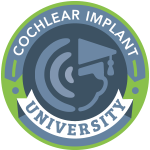CI Maintenance
When you’re away at college, it will be your sole responsibility to take care of your cochlear implants. Staying on top of your cochlear implant maintenance will reduce the likelihood urgent technical issues which compromise your hearing.
For example, Molly is a freshman who has bilateral cochlear implants. When she moves into her dorm on-campus, she takes her back-up processor, extra batteries, cables, and microphones, and she uses dry storage for her processors every night. Before she went to college, she identified an audiology clinic near her college.
Partway through the semester, Molly has trouble with her processors not turning on – she changes the batteries and they still don’t work. When Molly tries to turn on her back-up processor, it also does not work. Molly ships her processors to the cochlear implant manufacturer for repair, but she still needs access to sound while she waits for the manufacturer to send her processors back. What would you do until you got your processors back?
Preparation before arriving at school can make regular cochlear implant maintenance a little easier. We recommend that you:
- Research the closest audiologist(s) to your school and determine transportation needed to get to the audiologist’s office.
- Determine what your insurance covers for audiologist services (in-network, out-of-network).
- Get an updated copy of your insurance card.
- Check the length and coverage of product warranties.
- Research technical support from the cochlear implant manufacturer available near your school.
- Stock up on extra batteries, microphone protectors, back-up coils, and cables to bring with you.
Once you are at school, you should consider changes in the environment and your habits to ensure your cochlear implant maintenance is adequate. Here are a few things to think about:
- If your school is located in a higher-humidity environment, you may need to change your microphone protectors and use your drying station more often.
- You may want to consider wearing a medical bracelet informing emergency medics that you have cochlear implants and therefore cannot undergo MRIs.
- Your sleep patterns might be different now that you have different study habits and class times, so it’s important to ensure that your cochlear implants get enough time on their drying station.
As a student with cochlear implants, you have likely already had numerous occasions in which you needed to trouble-shoot to address issues.
If someone in your family took responsibility for trouble-shooting certain problems with your cochlear implants, make sure you talk with them so you know how to do the things they did. This will help when you’re away at school and they aren’t available. Your cochlear implant manufacturer’s website is also a good resource – they often provide trouble-shooting tips for each sound processor they manufacture. Take a few minutes to create a short list of common trouble-shooting tips that work for you.
If one (or both) of your sound processors stop working or you have other equipment problems, it is important to have a solid plan of action.
We recommend keeping a back-up sound processor in a safe place in your dorm room, not at home, since you won’t have easy access to it when you need it.
If you don’t have a back-up sound processor, or it’s not working, you should email or call your local audiologist or audiology clinic. They may have a sound processor you can borrow until you are able to get your sound processors repaired. Just be aware that the processor you borrow may not be optimal – some students describe the experience as “miserable,” but they were able to attend their classes normally and have access to sound.
- CI Maintenance Tips Handout
- Check your cochlear implant manufacturer’s website for detailed instructions for trouble-shooting and maintenance.

